Read the transcription of Carney and Trump’s White House meeting.
Prime Minister Mark Carney and U.S. President Donald Trump gave a press conference prior to a highly anticipated meeting at the White House on Tuesday.
Here’s a transcription of what the leaders said about the U.S. and Canada:
Donald Trump: Thank you very much everybody. It’s a great honour to have Prime Minister Mark Carney with us.
As you know, just a few days ago, he won a very big election in Canada, and I think I was probably the greatest thing that happened to him, but I can’t take a vote. His party was losing by a lot, and he ended up winning. So, I really want to congratulate him. It was probably one of the greatest comebacks in the history of politics, maybe even greater than mine.
But I want to just congratulate you. That was a great election, actually. We were watching it with interest, and I think Canada chose a very talented person, a very good person, as we spoke before the election quite a few times. And it’s an honour to have you at the White House and the Oval Office.
You see the new and improved Oval Office as it becomes more and more beautiful with love. Handle it with great love and 24 karat gold, that always helps too. But it’s been a lot of fun going over some of the beautiful pictures that were stored in the vaults that were for many, many years -- in some cases over 100 years -- it was stored in vaults of the great presidents, who are all most great presidents, all having a reason for being up every one of them. So, it’s very interesting.
But I just want to congratulate you, and you ran a really great race. I watched the debate. I thought you were excellent. And I think we have a lot of things in common. We have some tough, tough points to go over, and that’ll be fine. We’re going to also be discussing Ukraine-Russia, the war, because Mark wants it ended as quickly as I do. I think it has to end.
We had some very good news last night. The Houthis have announced that they are not, or they’ve announced to us, at least, that they don’t want to fight anymore. They just don’t want to fight. And we will honour that, and we will stop the bombings, and they have capitulated, but more importantly, we will take their word. They say they will not be blowing up ships anymore, and that’s what the purpose of what we were doing. So that’s just news, we just found out about that. So, I think it’s very, very positive. They were not going to have a lot of ships going, as you know, sailing beautifully down the various seas. It wasn’t just a canal, it was a lot of other places. And I will accept their word, and we are going to stop the bombing of the Houthis, effective immediately.
And Marco, you’ll let everybody know that. Do you have something to say about that, by the way? It’s a pretty big announcement.
Marco Rubio: This was always a freedom of navigation issue. These band of individuals with advanced weaponry that were threatening global shipping, and the job was to get that to stop, and if it’s going to stop and then we can stop. And so, I think it’s an important development.
Donald Trump: And we’ll have, maybe, before the Middle East and Saudi Arabia, we’re going to UAE and Qatar, and that’ll be, I guess, Monday night, some of you are coming with us.
I think before then, we’re going to have a very, very big announcement to make, like, as big as it gets, and I won’t tell you on what, and it’s very positive. I’d also I tell you if it was negative or positive, I can’t keep that up. It is really, really positive. And that announcement will be made either Thursday or Friday or Monday before we leave, but it’ll be one of the most important announcements that have been made in many years about a certain subject, very important subject. So, you’ll all be here.
Mark, would you like to say a few words?
Mark Carney: Thank you, Mr. President, I’m on the edge of my seat, actually. But thank you for your hospitality and above all, for your leadership. You’re a transformational president, focused on the economy, with a relentless focus on the American worker, securing your borders, ending the scourge of fentanyl and other opioids, and in securing the world.
And I’ve been elected with my colleagues here, with the help of my colleagues here, I’m going to spread the credit, to transform Canada with a similar focus on the economy, securing our borders, again, on fentanyl, much greater focus on defence and security, securing the Arctic and developing the Arctic. And, you know, the history of Canada and the U.S. is we’re stronger when we work together. And there’s many opportunities to work together. And I look forward to, you know, addressing some of those issues that we have, but also finding those areas of mutual cooperation.
Donald Trump: Very nice. Thank you very much. Very nice statement.
Reporter: Is USMCA dead?
Donald Trump: No, it was actually very effective, and it’s still very effective, but people have to follow it. So, you know, that’s been a problem. People haven’t followed it, but it was a transitional step a little bit. And as you know, it terminates fairly shortly. It gets renegotiated very shortly. But I thought it was a very positive step from NAFTA. NAFTA was the worst trade deal in the history of our country, probably in the history of the world, and this was a transitional deal, and we’ll see what happens. You know, we’re going to be starting to possibly renegotiate that if it’s even necessary. I don’t know that it’s necessary anymore, but it served a very good purpose. And the biggest purpose it served is we got rid of NAFTA. NAFTA was a very unfair deal for the United States, very, very terrible deal. It should have never been made. It was made many years ago, but it should have never been made.
Reporter: Would you like to see your first trade deal being with Canada?
Donald Trump: I would love that. Look, I have a lot of respect for this man, and I watched him come up, in a sense, through the ranks when he wasn’t given much of a chance. And he did.
He ran a really great campaign. He did a really great debate. I think that debate was very helpful. I was going to raise my hand. I don’t know if that’s good or bad, I shouldn’t say that, that might hurt you.
But no, he ran a really great election, I thought. And yeah, something could happen. Something could happen.
Reporter: What’s the top concession you want out of Canada?
Donald Trump: Concession?
Reporter: Yes
Donald Trump: Friendship.
Reporter: That’s not a concession:
Donald Trump: Oh, just, I just, we’re going to be friends with Canada. Regardless of anything. We’re going to be friends with Canada. Canada is a very special place to me. I know so many people that live in Canada. My parents had relatives that lived in Canada, my mother in particular. And no, I love Canada I have a lot of respect for the Canadians. Wayne Gretzky, I mean, how good, the great one. You happen to have a very, very good hockey player right here on the Capitals who is a big, tough cookie, who just broke the record, and he’s a great guy. And you know, we had the team here, and I got to know a lot of the players. But no, Canada is a very special place.
Reporter: Mr. president, and Mr. prime minister I’d like your response too. Mr. president, you have said that Canada should become the fifty first state.
Donald Trump: No, no. Well, I still believe that. But, you know, takes two to tango, right?
But no, I do. I mean, I believe it would be a massive tax cut for the Canadian citizens. You get free military, you get tremendous medical cares and other things. There would be a lot of advantages, but it would be a massive tax cut.
And it’s also a beautiful, you know, as a real estate developer, you know, I’m a real estate developer at heart. When you get rid of that artificially drawn line, somebody drew that line many years ago with, like, a ruler, just a straight line right across the top of the country.
When you look at that beautiful formation, when it’s together, I’m a very artistic person, but when I looked at that, you know, I said, ‘That’s the way it was meant to be.’
But, you know, I just, I do feel it’s much better for Canada, but we’re not going to be discussing that unless somebody wants to discuss it.
I think that there are tremendous benefits to the Canadian citizens, tremendously lower taxes, free military, which honestly, we give you essentially anyway, because we’re protecting Canada. But I think, you know, it would really be a wonderful marriage, because it’s two places that get along very well. They like each other a lot.
Mark Carney: Well, if I may, as you know, from real estate, there are some places that are never for sale.
Donald Trump: That’s true.
Mark Carney: We’re sitting in one right now, you know, Buckingham Palace you visited as well, and having met with the owners of Canada over the course of the campaign last several months, it’s not for sale. It won’t be for sale, ever.
But the opportunity is in partnership and what we can build together. And we have done that in the past, and part of that, as the president just said, is with respect to our own security. And my government is committed for a step change in our investment in Canadian security and our partnership. And I’ll say this as well, that the president has revitalized international security, revitalized NATO, and us playing our full weight in NATO.
Donald Trump: I will say, Canada is stepping up the military participation because Mark knew, you know, they were low, and now they’re stepping it up, and that’s a very important thing.
But never say never. Never say never.
Reporter: What would it take to get the tariffs off of Canada?
Donald Trump: Well, we’ll be talking about different things. You know, we want to protect our automobile business, and so does Mark.
But we want to protect, we want to make the automobiles, and we want to, you know, we have a tremendous abundance of energy, more than any country. We have, just in Alaska alone, ANWR has been reopened now, ANWR was probably the largest find anywhere in the world. They say it’s larger than Saudi Arabia, I don’t know, but it’s a lot.
But we have tremendous amounts of energy. Other countries don’t. We’re both lucky in that way. They have energy. We have energy. We have more than we could ever use, and more than we could ever sell, actually, and you have the same thing. So, we’re two countries that are very lucky. If you look at China, they don’t have that. You know, it’s a big disadvantage. Other countries, most countries don’t have, you know, most countries don’t have that. So, Canada and us, we have a lot of a lot of advantages all over the place.
Reporter: When you consider what Mr. Carney just said, that Canada is not for sale, does this make the discussion a little more difficult to start on?
Donald Trump: No, not at all. Time. Time will tell. It’s only time. But I say, never say never.
I’ve had many, many things that were not doable, and they ended up being doable and only doable in a very friendly way. But if it’s to everybody’s benefit, you know, Canada loves us, and we love Canada, that’s, I think, the number one thing that’s important. But we’ll see, I mean over time, we’ll see what happens.
Reporter: Clarifying something you said on the USMCA, is the United States prepared to walk away from that pact?
Donald Trump: What pact?
Reporter: USMCA.
Donald Trump: No, no. It’s fine. It’s there. It’s good. We use it for certain things. It’s there. The USMCA is a good deal for everybody.
I won’t say this about Mark, but I didn’t like his predecessor. I didn’t like a person that worked, she was terrible, actually. She was a terrible person, and she really hurt that deal very badly, because she tried to take advantage of the deal, and she didn’t get away with it, you know who I’m talking about.
But so, you know, we had a bad relationship having to do with the fact that we disagreed with the way they viewed the deal, and we ended it, you know, we ended that relationship pretty much. The USMCA is great for all countries. It’s good for all countries. We do have a negotiation coming up over the next year or so to adjust it or terminate it.
Mark Carney: I’ll say a word on USMCS, if I may, Mr. president. It is a basis for a broader negotiation. Some things about it are going to have to change. And part of the way you’ve conducted these tariffs has taken advantage of existing aspects of USMCA, so it’s going to have to change. There’s other elements that have come and that’s part of what we’re going to discuss.
Reporter: During the campaign, Prime Minister Carney talked about the American [?], how do you react when Canada decided not to shop in the American store as much as before, and decided to partner with other countries?
Donald Trump: Well, we don’t do much business with Canada from our standpoint. They do a lot of business with us. We’re at like 4 per cent and usually those things don’t last very long.
You know, we have great things, great product. The kind of product we sell, nobody else can sell, including military.
Look, we make the best military equipment in the world. And Canada buys our military equipment, which we appreciate. But we make the best military equipment in the world, by far, the missiles, the submarines, everything. Everything we have is really top notch.
I rebuilt our military during our last term. Stupidly, we gave some away to Afghanistan, which shouldn’t have happened, but that was, I think it was the most embarrassing moment in the history of our country. It was just very incompetent people.
But if you look, the man that’s now the head of our Joint Chiefs, he led the attack on ISIS for me, that’s why he’s the head of the Joint Chiefs, and “Razin” Caine, he was unbelievable. And as you know, we defeated ISIS in three weeks. It was supposed to take five years. We did it in three weeks, and he ran the campaign. I said, I like him, but I knew him before. I went to Iraq, and we agreed to a plan, and that was the plan. And as you know, we did it in record time. So, we have the best equipment in the world. We have the best a lot of things, but Canada does a lot more business with us than we do with Canada.
Reporter: What changes would you like to see to the USMCA? Or what changes would you make?
Donald Trump: We’re going to work on some subtle changes, maybe? I don’t even know if we’re going to be dealing with USMCA. We’re dealing more with concepts right now. Look, right now, we’re doing trade. We have trade. They’re paying a tariff on cars and steel and aluminum, and I think we have a baseline of 10 per cent or something like that for the tariffs. But we’re getting along very well. Right now, going no further, but we have an agreement, we did something with even parts. You want to discuss that, Howard? With respect to Canada, which helps Canada out.
Howard Lutnick: Sure, we’ve made arrangements with the car companies that 15 per cent of their USMCA parts are included, and then 15 per cent of foreign parts from the manufactured subject to retail price are not tariffed to help domestic manufacturing really thrive.
Donald Trump: So, it gave them a chance to be able to build their car parts, factories. A lot of these companies already have factories, and What they have to do is just fill them out, but they’re able to build them in the United States, so we gave them a pretty substantial period of time.
Reporter: Is there anything the prime minister could say to you today to change your mind on tariffing Canada?
Donald Trump: Tariffing cars?
Reporter: Tariffing Canada. Is there anything he can say to you in the course of your meetings with him today that could get you to lift tariffs on Canada?
Donald Trump: No.
Reporter: Why not?
Donald Trump: It’s just the way it is.
Reporter: On the 51st state, if Canadians don’t want it, would you respect that?
Donald Trump: Sure, I would. But this is not necessarily a one-day deal. This is over a period of time they have to make that decision.
Mark Carney: If I may. Well, respectfully, Canadians’ view on this is not going to change on the 51st state. Secondly, we are the largest client of the United States in the totality of all the goods. So, we are the largest client the United States. We have a tremendous auto sector between the two of us, and the changes that have been made have been helpful. You know, 50 per cent of a car that comes from Canada is American. That’s not like anywhere else in the world. And to your question about, is there one thing? No, this is a bigger discussion. There are much bigger forces involved and this will take some time and some discussions, and that’s why we’re here, to have those discussions, and that is represented by who’s sitting around the table.
Donald Trump: See the conflict is, and this is very friendly, this is not going to be like, we had another little blow up with somebody else. That was a much different… this is a very friendly conversation.
But we want to make our own cars. We don’t really want cars from Canada, and we put tariffs on cars from Canada, and at a certain point it won’t make economic sense for Canada to build those cars.
And we don’t want steel from Canada, because we’re making our own steel away massive steel plants being built right now as we speak. We really don’t want Canadian steel, and we don’t want Canadian aluminum and various other things, because we want to be able to do it ourselves.
And because of, you know, past thinking of people, we have a tremendous deficit with Canada. In other words, they have a surplus with us, and there’s no reason for us to be subsidizing Canada. Canada is a place that will have to be able to take care of itself economically. I assume they can.
I will tell you that Trudeau, when I spoke to him, I used to call him Governor Trudeau. I think that probably didn’t help his election, but when I spoke to him, I said, so why are we taking your cars? We want to make them ourselves.
I mean, I said, and if the price of your cars went up, or if we put a tariff on your cars of 25 per cent, what would that mean to you? He said that would mean the end of Canada. He actually said that to me, and I said, that’s a strange answer, but I understand his answer.
But no, I mean, it’s hard to justify subsidizing Canada to the tune of maybe $200 billion a year. We protect Canada militarily, and we always will. We’re going to, you know, that’s not a money thing, but we always will. But, you know, it’s not fair. But why are we subsidizing Canada $200 billion a year, or whatever the number might be, it’s a very substantial number. And it’s hard for the American taxpayer to say, “gee whiz, we love doing that.”
Thank you very much.
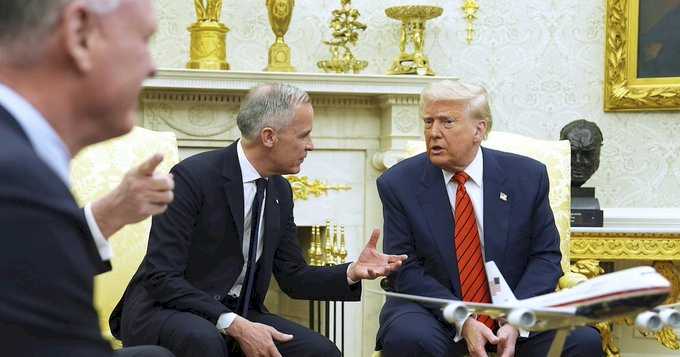
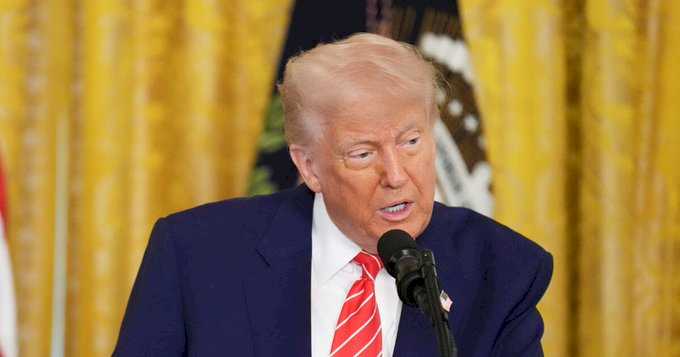

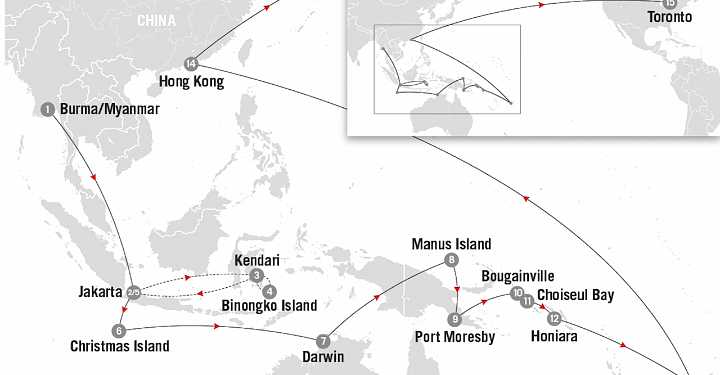



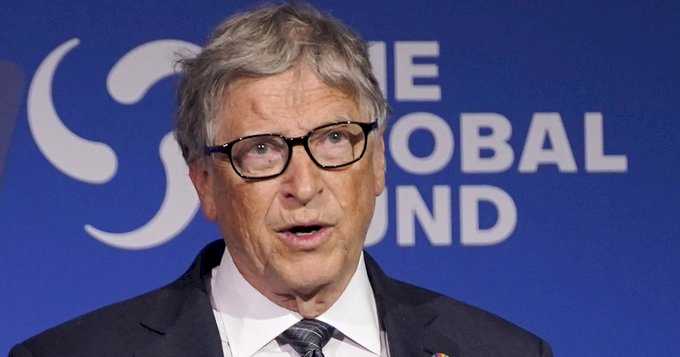
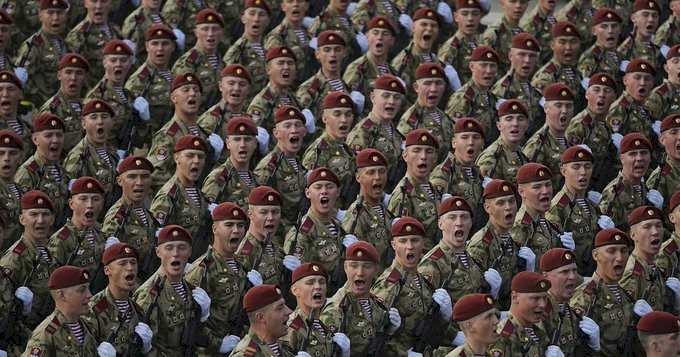

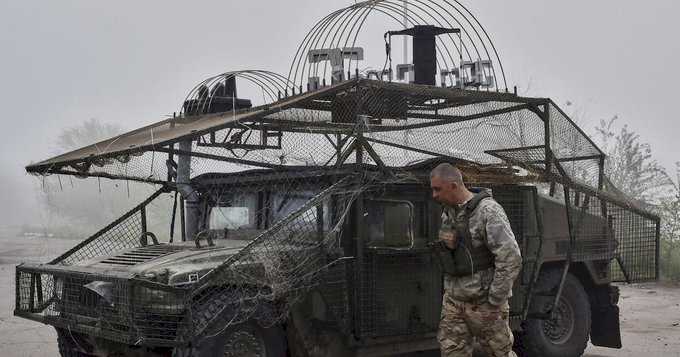
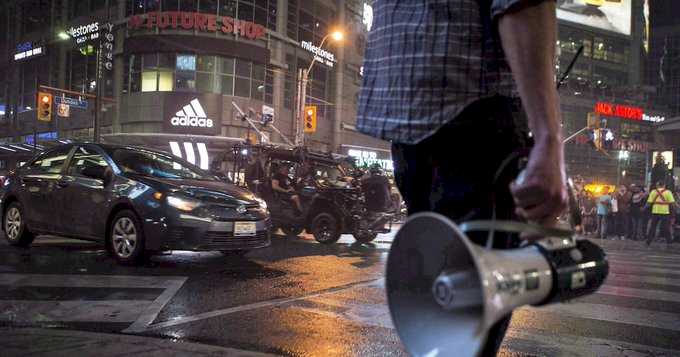
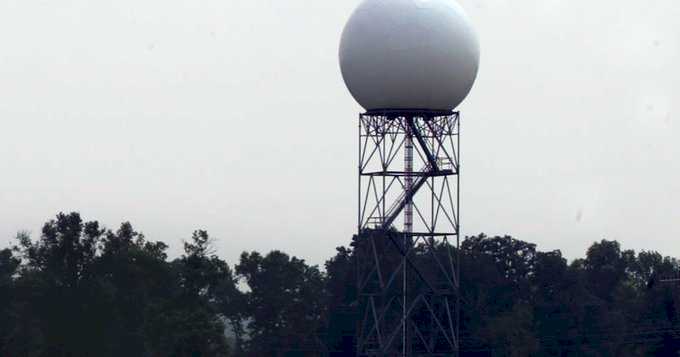
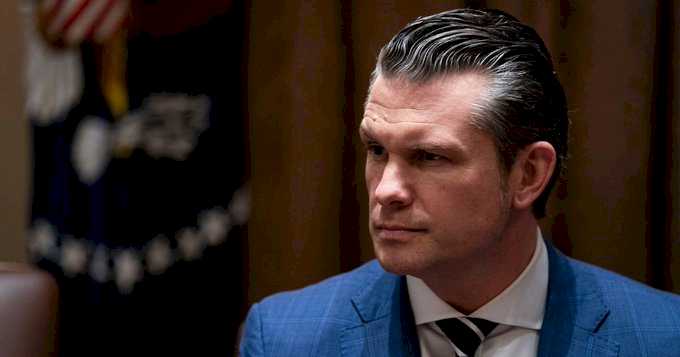

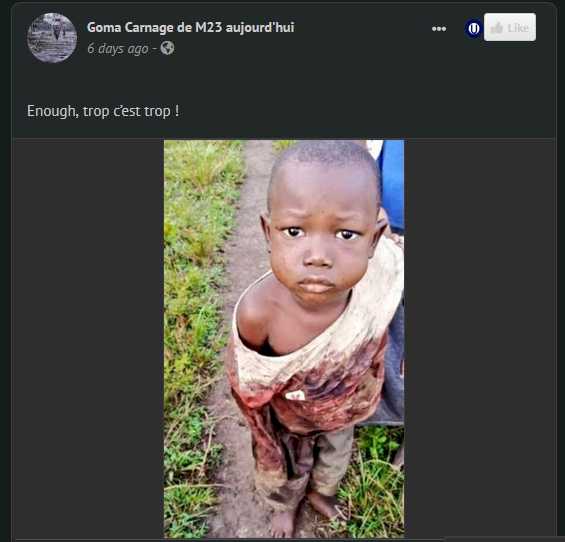
Global news on Umojja.com